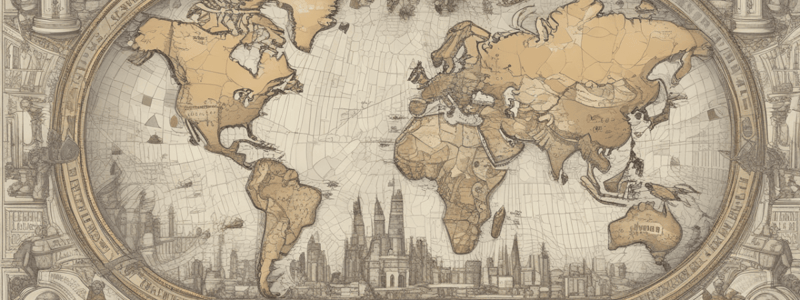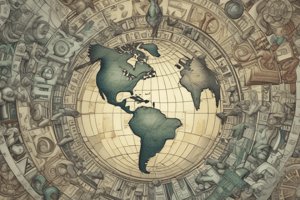Podcast
Questions and Answers
What is the primary goal of the Economic Democracy Act?
What is the primary goal of the Economic Democracy Act?
- To reduce inflationary pressure in the economy
- To increase the regulatory power of central banks
- To broaden capital ownership and make everyone creditworthy (correct)
- To consolidate commercial banks and improve their efficiency
What allows ordinary people to borrow money and finance new capital in the Economic Democracy Act system?
What allows ordinary people to borrow money and finance new capital in the Economic Democracy Act system?
- Capital Credit Insurance
- Insured credit allocations (correct)
- Central banks' monetary policies
- Commercial banks' lending policies
What is the primary function of Capital Credit Insurance?
What is the primary function of Capital Credit Insurance?
- To insure against inflationary risks
- To provide investment advice to individuals
- To regulate commercial banks' lending activities
- To provide a guarantee that the borrower will repay the loan (correct)
What type of banks are owned by their customers?
What type of banks are owned by their customers?
What is the primary role of commercial banks in the Economic Democracy Act system?
What is the primary role of commercial banks in the Economic Democracy Act system?
What is the primary function of central banks?
What is the primary function of central banks?
What is the purpose of a Clearing House?
What is the purpose of a Clearing House?
How do commercial banks create money in the Economic Democracy Act system?
How do commercial banks create money in the Economic Democracy Act system?
What is the primary benefit of Capital Credit Insurance in the Economic Democracy Act system?
What is the primary benefit of Capital Credit Insurance in the Economic Democracy Act system?
What is the primary advantage of insured credit allocations in the Economic Democracy Act system?
What is the primary advantage of insured credit allocations in the Economic Democracy Act system?
What is the primary purpose of the Clearing House in the banking system?
What is the primary purpose of the Clearing House in the banking system?
What is the main characteristic of an elastic currency?
What is the main characteristic of an elastic currency?
Which school of economics follows the banking principle?
Which school of economics follows the banking principle?
What is the primary function of the discount window in a central bank?
What is the primary function of the discount window in a central bank?
What is the key characteristic of money creation under the banking principle?
What is the key characteristic of money creation under the banking principle?
Who owns the Federal Reserve, according to the nominal ownership structure?
Who owns the Federal Reserve, according to the nominal ownership structure?
What is the primary goal of the Economic Democracy Act?
What is the primary goal of the Economic Democracy Act?
What is the role of the state in the economy, according to the Economic Democracy Act?
What is the role of the state in the economy, according to the Economic Democracy Act?
What is the ultimate goal of the Economic Democracy Act, according to the content?
What is the ultimate goal of the Economic Democracy Act, according to the content?
What is the alternative to the current ownership structure of the central bank, proposed by the Economic Democracy Act?
What is the alternative to the current ownership structure of the central bank, proposed by the Economic Democracy Act?
Flashcards are hidden until you start studying
Study Notes
Economic Democracy Act
- The Economic Democracy Act is a system that aims to broaden capital ownership and make everyone creditworthy
- It uses future savings to finance new capital, allowing anyone with access to future savings to own new capital
- The system uses Capital Credit Insurance to substitute for traditional collateral, making it easier for people to borrow money
Insured Credit Allocations
- Insured credit allocations are critical to the Economic Democracy Act system
- They allow ordinary people to borrow money and finance new capital
- Capital Credit Insurance is used to make people creditworthy and ensure that lenders are repaid
Capital Credit Insurance
- Capital Credit Insurance is a substitute for traditional collateral
- It provides a guarantee that the borrower will repay the loan
- Insurance companies provide the guarantee in exchange for a small fee based on the risk of the investment
- This system avoids inflationary pressure from bad loans
Commercial and Cooperative Banks
- Commercial banks are financial institutions that take deposits, make loans, and issue promissory notes
- Cooperative banks are owned by their customers
- Both types of banks can facilitate commerce and create money
- Commercial banks discount or accept bills of exchange from borrowers with feasible investments and creditworthy individuals
- They issue promissory notes backed by the accepted bill of exchange
Role of Commercial Banks
- Commercial banks create money and facilitate commerce
- They accept bills of exchange and issue promissory notes
- They provide financing for the private sector
- They use promissory notes to back the money they create
Role of Central Banks
- Central banks serve commercial banks
- They ensure that member banks have adequate reserves to cover obligations
- They maintain an elastic and uniform currency
- They provide adequate liquidity for the private sector
- They were originally formed to provide stable and asset-backed currency### Clearing House Operations
- A Clearing House is a central institution that banks use to settle their obligations with each other.
- Instead of individual banks dealing with each other, they present their obligations to the Clearing House, which offset the balances at the end of each day.
- This prevents the "dirty trick" of driving a rival bank out of business by collecting obligations and presenting them all at once for payment.
Elastic Currency
- An elastic currency is a currency that expands and contracts with the needs of the economy.
- This type of currency is designed to avoid both inflation and deflation problems.
Currency Principle vs. Banking Principle
- The currency principle is based on trying to second-guess how much money is needed in the economy and printing it accordingly.
- The banking principle links the creation of money directly to the need for money, with new money being created only for financially feasible projects or backed by existing wealth.
- Binary economics is the only school of economics that follows the banking principle.
Central Bank Functions
- A central bank provides money and liquidity through two operations: the discount window and open market operations.
- The discount window applies to future savings and accepts or rediscounts bills of exchange previously accepted or rediscounted by member banks.
- Open market operations are a past savings mechanism that breaks up large pieces of money into smaller ones for day-to-day transactions.
Money Creation
- Under the banking principle, money is created when there is a financially feasible project or existing wealth to back it.
- This approach ensures that the value of money is stable and asset-backed.
Central Bank Ownership
- The Federal Reserve is nominally owned by its member banks, but the federal government controls it through the president's appointment of the chairman and Senate approval.
- The Economic Democracy Act proposes that all citizens in a region should own the central bank instead of member banks.
Role and Powers of the State
- The Economic Democracy Act aims to reduce the state's role in the economy and give power to the people.
- The state's role is to eliminate special privileges, monopolies, and barriers to equal participation, enforce contracts, police abuses, and provide a level playing field.
Key Takeaways
- The economic democracy act seeks to establish a just social order and a justly structured state government.
- This is achieved through the four pillars of an economically just social order: a limited economic role for the state, free and open markets, restoration of private property rights, and expanded capital ownership.
- Ultimately, the choice is between owning or being owned.
Economic Democracy Act
- Aims to broaden capital ownership and make everyone creditworthy by using future savings to finance new capital
- Allows anyone with access to future savings to own new capital
Insured Credit Allocations
- Critical to the Economic Democracy Act system
- Enables ordinary people to borrow money and finance new capital
- Uses Capital Credit Insurance to make people creditworthy and ensure lenders are repaid
Capital Credit Insurance
- Substitutes for traditional collateral
- Provides a guarantee that the borrower will repay the loan
- Insurance companies provide the guarantee in exchange for a small fee based on the risk of the investment
- Avoids inflationary pressure from bad loans
Commercial and Cooperative Banks
- Commercial banks: financial institutions that take deposits, make loans, and issue promissory notes
- Cooperative banks: owned by their customers
- Both facilitate commerce and create money
- Commercial banks discount or accept bills of exchange from borrowers with feasible investments and creditworthy individuals
- Issue promissory notes backed by the accepted bill of exchange
Role of Commercial Banks
- Create money and facilitate commerce
- Accept bills of exchange and issue promissory notes
- Provide financing for the private sector
- Use promissory notes to back the money they create
Role of Central Banks
- Serve commercial banks
- Ensure member banks have adequate reserves to cover obligations
- Maintain an elastic and uniform currency
- Provide adequate liquidity for the private sector
- Originally formed to provide stable and asset-backed currency
Clearing House Operations
- Central institution where banks settle their obligations with each other
- Prevents the "dirty trick" of driving a rival bank out of business by collecting obligations and presenting them all at once for payment
Elastic Currency
- Currency that expands and contracts with the needs of the economy
- Designed to avoid both inflation and deflation problems
Currency Principle vs. Banking Principle
- Currency principle: tries to second-guess how much money is needed in the economy and prints it accordingly
- Banking principle: links money creation directly to the need for money, with new money created only for financially feasible projects or backed by existing wealth
- Binary economics is the only school of economics that follows the banking principle
Central Bank Functions
- Provides money and liquidity through two operations: discount window and open market operations
- Discount window applies to future savings and accepts or rediscounts bills of exchange previously accepted or rediscounted by member banks
- Open market operations: past savings mechanism that breaks up large pieces of money into smaller ones for day-to-day transactions
Money Creation
- Under the banking principle, money is created when there is a financially feasible project or existing wealth to back it
- Ensures the value of money is stable and asset-backed
Central Bank Ownership
- Federal Reserve is nominally owned by member banks, but the federal government controls it through the president's appointment of the chairman and Senate approval
- Economic Democracy Act proposes that all citizens in a region should own the central bank instead of member banks
Role and Powers of the State
- Economic Democracy Act aims to reduce the state's role in the economy and give power to the people
- State's role is to: eliminate special privileges, monopolies, and barriers to equal participation; enforce contracts; police abuses; and provide a level playing field
Studying That Suits You
Use AI to generate personalized quizzes and flashcards to suit your learning preferences.




